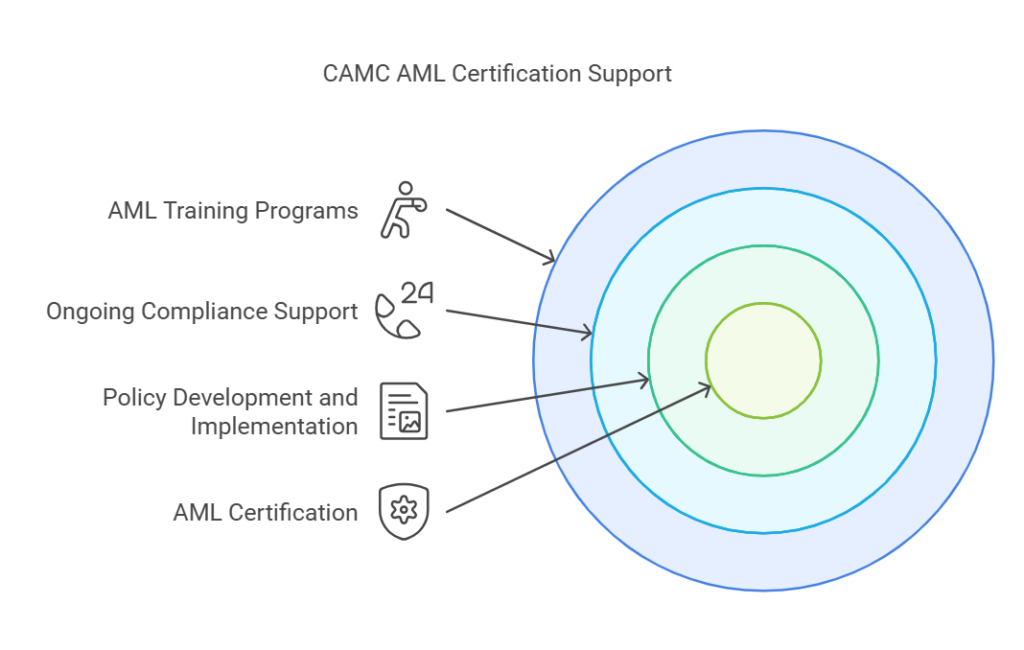Introduction
In an era of heightened regulatory scrutiny and increasing financial crimes, Anti-Money Laundering (AML) certification has become an essential qualification for businesses, especially in financial hubs like the United Arab Emirates (UAE). Obtaining AML certification not only ensures compliance but also demonstrates a commitment to maintaining the highest standards of integrity in financial transactions. This blog will explore why AML certification is crucial for UAE businesses and how it can help mitigate the risks associated with money laundering and terrorist financing.
What is AML Certification?
AML certification is a qualification that provides individuals and businesses with the knowledge and skills necessary to identify and prevent money laundering and terrorist financing activities. AML certification courses cover essential topics such as Customer Due Diligence (CDD), Suspicious Activity Reporting (SARs), and risk-based approaches to compliance.

Common AML certifications include:
- Certified Anti-Money Laundering Specialist (CAMS)
- International Diploma in Anti Money Laundering (ICA)
- Certified Financial Crime Specialist (CFCS)
These certifications are designed to equip professionals with the expertise required to comply with regulatory requirements, particularly in jurisdictions like the UAE, where AML regulations are stringent.
Importance of AML Certification for UAE Businesses
1. Ensuring Compliance with UAE Regulations
The UAE has implemented strict AML regulations to comply with international standards set by organizations like the Financial Action Task Force (FATF). Businesses operating in the UAE are required to establish robust AML frameworks to detect and prevent financial crimes. AML certification helps professionals understand and implement the DFSA AML Rulebook and other relevant guidelines effectively.
Without proper certification, businesses risk non-compliance, which can lead to severe penalties, including fines and restrictions on operations. Learn more about the DFSA AML Rulebookhere.
2. Reducing Financial and Reputational Risk
Money laundering and terrorist financing pose significant risks to businesses, including financial loss, legal liabilities, and damage to reputation. Obtaining AML certification ensures that employees are well-versed in recognizing suspicious activities and implementing the appropriate measures to prevent illicit transactions.
By having certified professionals, businesses can reduce the likelihood of being involved in money laundering activities, which helps maintain trust among clients, partners, and regulatory authorities.
3. Strengthening Internal Controls
AML-certified professionals play a vital role in enhancing an organization’s internal controls. They help design and implement effective AML policies, conduct risk assessments, and monitor transactions for suspicious activities. Strong internal controls are a key component of an effective AML compliance program.
Visit our Compliance Department Setup Services to learn how to establish robust internal controls for your business.
4. Gaining a Competitive Edge
In a competitive market like the UAE, businesses that prioritize compliance and integrity often have a significant advantage over their peers. AML certification is a way for companies to differentiate themselves by showcasing their commitment to financial transparency and ethical business practices. This can be especially appealing to international clients and partners who prioritize working with compliant businesses.
5. Enhancing Employee Expertise
AML certification programs are designed to provide employees with the latest knowledge on AML regulations, typologies of money laundering, and best practices for compliance. This continuous learning process ensures that staff members are always up to date with the evolving regulatory landscape, which is essential for staying compliant.
For more information on how to enhance employee expertise through tailored training programs, explore our AML Compliance Training Services.

Key AML Certifications for UAE Professionals
1. Certified Anti-Money Laundering Specialist (CAMS)
The CAMS certification, offered by the Association of Certified Anti-Money Laundering Specialists (ACAMS), is one of the most recognized AML qualifications globally. It covers essential topics such as Customer Due Diligence (CDD), transaction monitoring, and suspicious activity reporting.
2. International Diploma in Anti Money Laundering (ICA)
The International Compliance Association (ICA) offers a diploma in AML that provides in-depth knowledge of international best practices, including the requirements of the Financial Action Task Force (FATF). This certification is particularly beneficial for professionals working in international financial hubs like the UAE.
3. Certified Financial Crime Specialist (CFCS)
The CFCS certification is offered by the Association of Certified Financial Crime Specialists (ACFCS). It covers a broader range of financial crime topics, including fraud, corruption, and cybercrime, making it ideal for professionals seeking a holistic understanding of financial crime prevention.
How AML Certification Benefits Different Sectors
1. Banking and Financial Services
For banks and other financial institutions, AML certification is crucial for maintaining compliance with both local and international AML standards. Certified employees are better equipped to handle Customer Due Diligence (CDD), identify Politically Exposed Persons (PEPs), and report suspicious activities through the goAML platform.
Learn more about our goAML Compliance Services and how we assist financial institutions in meeting their regulatory obligations.
2. Real Estate
The real estate sector is a high-risk area for money laundering due to the large volumes of transactions and the potential for anonymity. AML certification ensures that real estate agents and brokers are trained to conduct proper due diligence, identify red flags, and report suspicious activities.
3. Designated Non-Financial Businesses and Professions (DNFBPs)
DNFBPs, such as law firms, accounting firms, and precious metal dealers, are also required to comply with AML regulations in the UAE. AML certification helps professionals in these sectors understand their regulatory obligations, conduct risk assessments, and establish effective AML policies.
4. Insurance Companies
Insurance companies are also vulnerable to money laundering risks, particularly through life insurance products. AML certification helps insurance professionals understand how to monitor policies, identify suspicious claims, and comply with reporting requirements.

Challenges in Obtaining AML Certification
1. Cost and Time Investment
Obtaining an AML certification requires both a financial and time investment. The costs of training programs and certification exams can be substantial, particularly for smaller businesses. Additionally, professionals must dedicate time to study and prepare for certification exams.
2. Keeping Up with Regulatory Changes
AML regulations are constantly evolving, and professionals must stay updated with the latest changes to maintain their certification. Many certification programs require continuing education and regular renewals, which can be challenging for busy professionals.
3. Finding the Right Certification
With several AML certifications available, it can be challenging to determine which one is most suitable for a particular role or industry. Businesses must assess their specific needs and choose a certification program that aligns with their industry requirements and regulatory obligations.
How CAMC Can Assist with AML Certification
Chartered AML Consultants (CAMC) offers a range of services to support businesses and professionals in obtaining AML certification and maintaining compliance. Our services include:
1. AML Training Programs
We provide tailored training programs designed to help employees prepare for AML certification exams. Our programs cover all key aspects of AML compliance, including Customer Due Diligence (CDD), suspicious activity reporting, and risk management.
2. Ongoing Compliance Support
Our team of experts offers ongoing support to ensure that businesses remain compliant with evolving regulations. We provide updates on regulatory changes, assist with risk assessments, and help businesses enhance their internal controls.
3. Policy Development and Implementation
We assist businesses in developing and implementing AML policies that align with regulatory requirements and international best practices. Our policies cover areas such as customer onboarding, transaction monitoring, and reporting requirements.

Explore our AML Policy Development Services for more information on how we can help your business.
Conclusion
AML certification is a critical investment for businesses operating in the UAE. It ensures compliance with stringent regulatory requirements, reduces financial and reputational risks, and strengthens internal controls. By equipping employees with the knowledge and skills needed to detect and prevent money laundering, businesses can create a culture of compliance and maintain the trust of their clients and regulators.
Whether you are in banking, real estate, insurance, or any other sector subject to AML regulations, obtaining AML certification is an essential step toward safeguarding your business from financial crimes. Partnering with CAMC can make this process smoother by providing tailored training programs, ongoing support, and expertise in AML policy development.
For more information on how CAMC can assist your business in obtaining AML certification and maintaining compliance, contact us today.
References
AML/CFT Policies – CAMC
https://www.unodc.org/unodc/en/money-laundering/index.html
Financial Conduct Authority (FCA) – AML Guidance
https://www.unodc.org/unodc/en/money-laundering/index.html
United Nations Office on Drugs and Crime – Anti-Money Laundering
https://www.unodc.org/unodc/en/money-laundering/index.html




